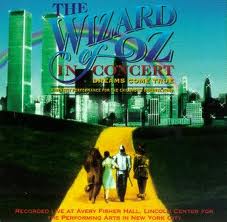Production
The production consists of an abbreviated script and highlights most songs and musical numbers from the movie. The most notable difference is Uncle Henry and the three farmhands do not appear in this production, but Joel Grey who narrates the Kansas scenes in his role of Professor Marvel and Debra Winger's "Cyclone" narration both mention Miss Gulch. The concert begins with Jewel as Dorothy Gale singing the complete version of "Over the Rainbow". The concert also includes the song "The Jitterbug", which was cut from the original film.
Throughout the entire concert, the conductor and orchestra are featured on-stage with the performers. The performers are predominantly positioned at music stands reading the script and music (similar to reader's theatre). The choreography is different from the 1939 movie: noticeable differences include the Munchkins not dancing and at no point do the four principals (Dorothy, Scarecrow, Tin Man and Cowardly Lion) dance together. Throughout the production, various pieces of Oz artwork by Charles Santore are projected on a screen in the back of the stage.
Various songs were changed to better feature specific talents of individual singers, including "If I Only Had a Brain", which had a folk music tempo to highlight Jackson Browne and "If I Only Had a Heart", which had a rock and roll tempo to highlight Roger Daltrey (Daltrey even swings his microphone, mimicking his Who persona). This stage adaptation omits the Wicked Witch's scene of threatening Dorothy, Scarecrow and Tin Man while being on top of the Tin Man's wooden cottage following this musical number.
The line about suggesting to the Cowardly Lion to count sheep prior to the musical number "If I Only Had the Nerve" is spoken by Dorothy rather than the Tin Man.
Phoebe Snow added a stirring "If I Only Had..." medley set to a solo piano, combining all three of the Scarecrow, Tin Man, and Cowardly Lion's desires.
Nathan Lane's portrayal of the Lion included a version of "If I Were King of the Forest", in which he adds to the lyrics: "not, queen, not duke, not prince...or the Artist Formerly Known as Prince".
This production shortens the Wicked Witch's Castle scenes due to time limit. The Winkies perform their chant, but appear without being dressed as guards and holding pikes. In the scene where Dorothy (Jewel) suffers her imprisonment after Aunt Em's image fades away in the crystal ball, Winger says the line "What a little whiner! I'll give you something to cry about" which was not spoken by Margaret Hamilton. It omits the scene of the Scarecrow, Tin Man, and Lion rescuing Dorothy and the Witch setting the Scarecrow on fire. It immediately leads into the Wicked Witch's meltdown scene followed by the musical number "Hail! Hail! The Witch is Dead" which was also cut from the original film.
Unlike Jack Haley, Daltrey as the Tin Man hugged the Wizard (Joel Grey) toward the end with a pleasant "Thank you from the bottom of my heart!". The Wizard did not depart from the Emerald City inside a hot-air balloon due to being in the same scene as Glinda the Good Witch.
The production featured an ensemble of background singers. One of them, Julia Murney, would go on to portray Elphaba in Wicked on the National Tour, and later on Broadway.
The performance was originally broadcast November 22 on both TNT and TBS, and issued on CD and VHS video in 1996. The video has not yet been released on DVD. Both the CD and video are currently out-of-print. However it is currently available on YouTube. [2]
This page is based on this
Wikipedia article Text is available under the
CC BY-SA 4.0 license; additional terms may apply.
Images, videos and audio are available under their respective licenses.
